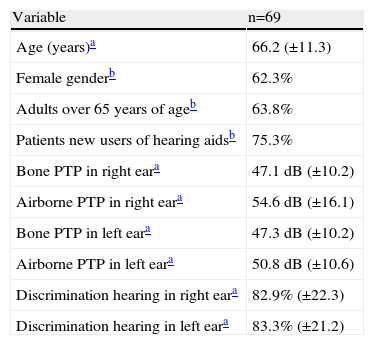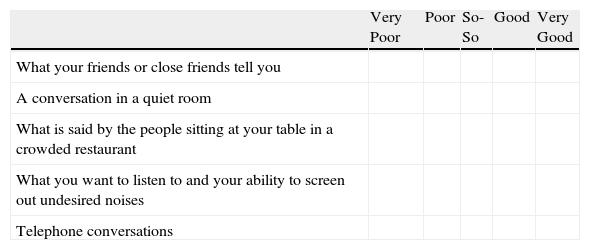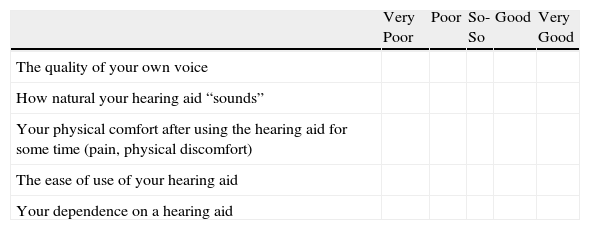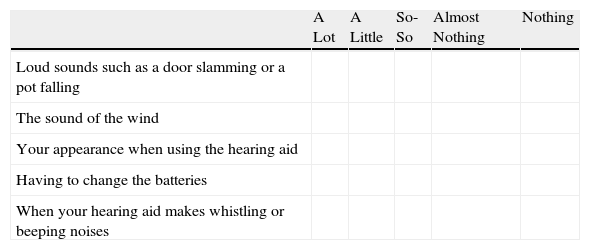It is becoming increasingly important to have reliable and valid questionnaires. This becomes especially important when evaluating hearing loss.
The aim of this work was to validate the «Effectiveness of Auditory Rehabilitation» (EAR) questionnaire for the Spanish-speaking population. This instrument assesses quality of life and hearing aspects in patients using hearing aids.
Material and methodCross-sectional validation study. A cultural adaptation through the use of English to Spanish translations and re-translations was carried out. The validity and reliability of the newly adapted instrument were evaluated.
ResultsA total of 69 individuals (44 older adults and 25 younger adults) were examined. The pure-tone averages were 47.3dB and 47.1dB for the left and right ears, respectively. The mean maximum speech discrimination in silence for monosyllables were 83.3% and 82.9% for the left and right ears, respectively. Internal consistency presented Cronbach alpha values of 0.85 and 0.77 for the internal and external dimensions, respectively. The intraclass correlation coefficients were 0.80 for the internal module and 0.85 for the external module. Construct validity reported a correlation coefficient of 0.71 at baseline and 0.76 at 3 months after the initial assessment for the internal module, and 0.62 at baseline and 0.74 at 3 months after the initial assessment for the external module. The size effects were 1.3 and 1.1 for the internal and external modules, respectively.
ConclusionsThe Spanish version of the EAR questionnaire seems to be a reliable and valid instrument. The evaluation of audiological aspects, as well as aspects relating to aesthetics and comfort are the main strengths of this instrument. Finally, the EAR scale is more sensitive to change than other scales.
Cada vez adquiere mayor importancia el contar con cuestionarios válidos y confiables. Esto cobra mayor relevancia al evaluar la hipoacusia.
El objetivo del trabajo es validar en población hispanohablante el cuestionario Effectiveness of Auditory Rehabilitation (EAR), que evalúa la calidad de vida y los aspectos auditivos en pacientes usuarios de audífonos.
Material y métodoEstudio de validación de instrumento. Se realizó adaptación transcultural por medio de traducción y retraducción, después comparación con la versión original, y evaluación de confiabilidad y validez.
ResultadosSe evaluaron 69 individuos, de los cuales 44 fueron adultos mayores y 25 fueron adultos jóvenes. El promedio tonal puro fue 47,3dB en oído izquierdo y 47,1 en derecho. La discriminación de monosílabos promedio fue 83,3% en oído izquierdo y 82,9% en derecho. La consistencia interna presentó un alfa de Cronbach de 0,85 y 0,77 para las dimensiones interna y externa. El coeficiente de correlación intraclase fue de 0,80 para el módulo interno y 0,85 para el externo. La validez de constructo informó de una correlación de 0,71 basal y 0,76 a los 3 meses para el módulo interno, y de 0,62 inicial y 0,74 a los 3 meses en el módulo externo. La magnitud de efecto fue de 1,3 y 1,1 para el módulo interno y externo.
ConclusionesLa versión al español del cuestionario EAR parece ser un instrumento confiable y válido. Sus fortalezas son que evalúa aspectos audiológicos, pero además aspectos estéticos y comodidad. Por último, es más sensible al cambio que otras escalas.

















